Suzanne Lazaroo
20 March 2024: The March round of graduations has just drawn to a close, and the University of Canberra spent an exhilarating three days celebrating its newest alumni from 18 March to today – while welcoming a return to pre-COVID-19 pandemic numbers at the ceremonies.
“We’re conferring around 2,600 awards this round, with just over 1,500 alumni walking across the stage,” said the University’s Interim Vice-Chancellor and President Professor Lucy Johnston.
“It’s clear that people attended the ceremonies in larger numbers this year, which also reflects how alive the campus is now – even before O-Week, we have had many students bringing family and friends to campus. It all contributes to that connection that we want all our alumni to have with the University.”
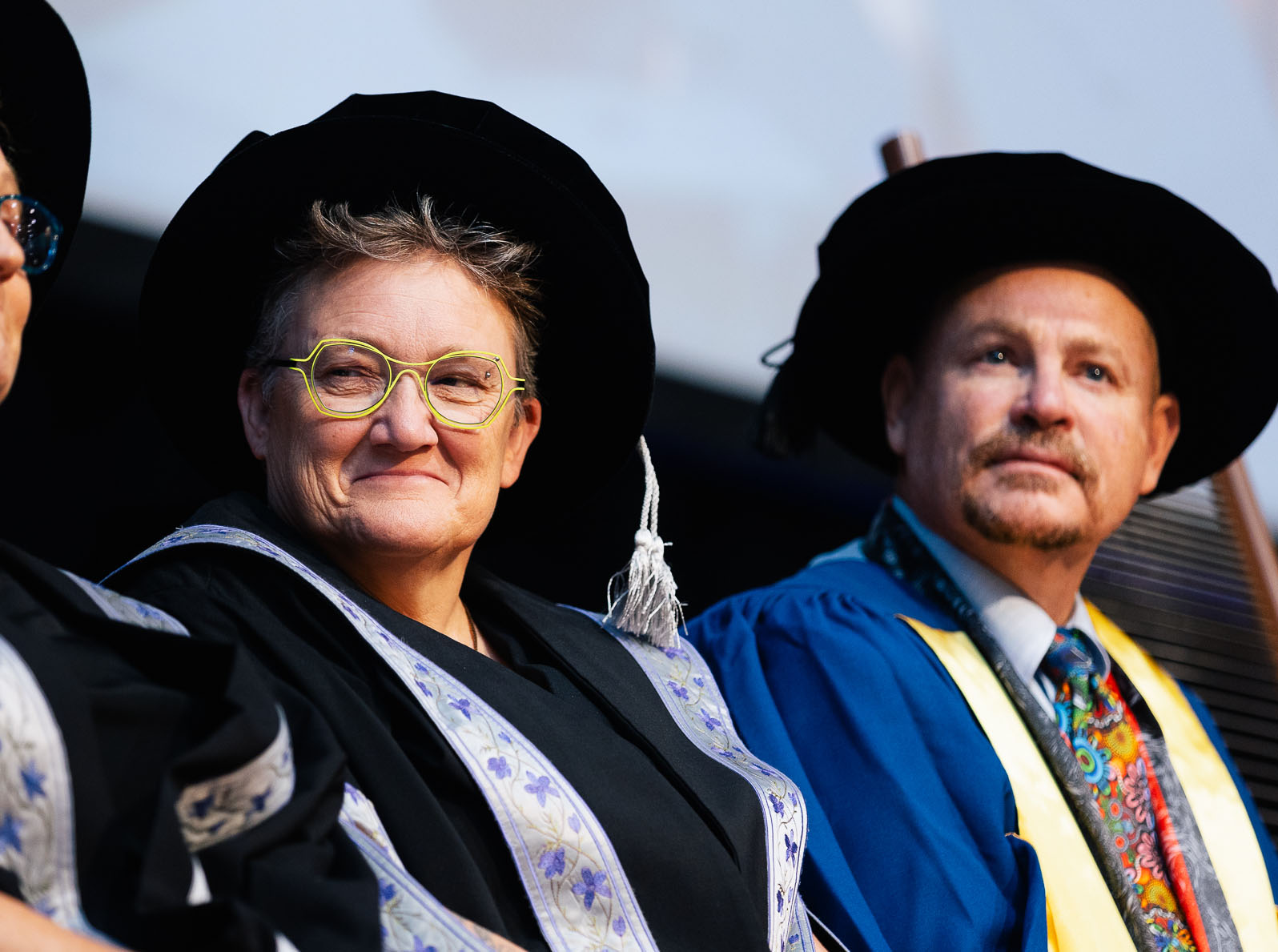
Professor Johnston offered her congratulations to the graduating class, especially in light of the challenges they have overcome to complete their certifications.
“These students have done it tough on a number of levels,” Professor Johnston said. “Some of them started their degrees during the COVID-19 pandemic – experiencing a rapid change not only to how they studied but also to the social aspect of university life, when they would normally be spending a lot of time with their peers.
“And then to come out of that time, and into this cost-of-living crisis, while also looking for future employment – they are all truly amazing.
“On Monday, at the Faculty of Science and Technology ceremony, we heard Nicholas Villiers, who graduated with a Master of Business Informatics, share his amazing story about growing up with his seven siblings in public housing, with a single mother who had an intellectual disability.”
Mr Villiers’ speech focused on the transformative nature of education and inclusion, as he explained how the University welcomed him, and provided him with opportunities he never thought he would have.
“Nicholas’ story epitomised what we stand for in terms of inclusion and support for people to reach their dreams. It was humbling to hear but also really reinforced the values that this university is built on,” Professor Johnston said.
“That’s one of the strengths that I see among all our graduates – resilience and the ability to persist, to take the knocks as they come, but go through and get to the end anyway, because they recognise the value of education.”
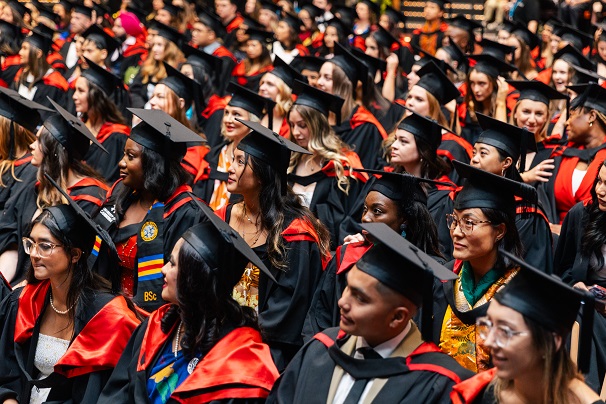
Several medals were awarded at the graduation ceremonies this year.
Named in honour of Emeritus Professor Herbert (Joe) Burton, who chaired the committee that recommended the establishment of the University’s precursor institution, the Canberra College of Advanced Education (CCAE), the Herbert Burton Medal is presented annually to a graduating bachelor degree student who has achieved outstanding academic results and made a valuable contribution to the University and the wider community.
This year, the Herbert Burton Medal was awarded to Ed Barrow, who graduated with a Bachelor of Science in Psychology (Honours).
“Receiving the Herbert Burton medal was a far and distant goal that I didn't imagine achieving, and upon reflection, it has made my years of additional work feel extremely validated and purposeful,” Mr Barrow said.
“The honour of receiving the medal has highlighted to me that I can achieve the goals that I set out, and even if I don’t achieve them, be appreciative of the effort that I put in and acknowledge that I did my best.”
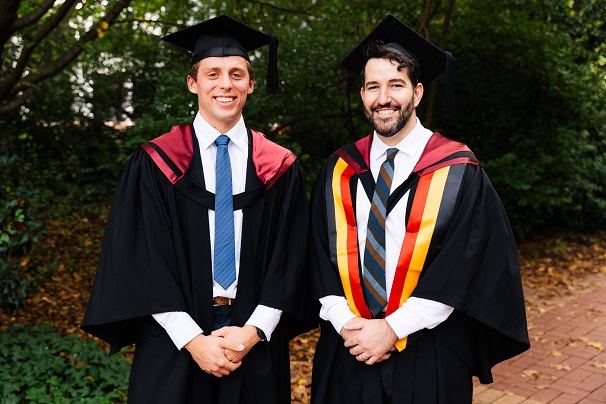
Daniel McDougall, who also attained a Bachelor of Science in Psychology (Honours), received the Tom Calma Medal. Named for the University’s former and first Indigenous Chancellor, Professor Tom Calma AO, the Medal is awarded to a graduating Aboriginal or Torres Strait Islander student with outstanding academic results and who has made a valuable contribution to the University and/or the wider community.
“Receiving the Tom Calma medal is a validation of all the years of hard work that I put in,” Mr McDougall said.
“It was not just the study, it was also all the other things going on in my life, and going through a tough honours year – being able to put all that together, really falling in love with studying and academia, pursuing a high level of excellence and doing work that impacts the community. Getting recognised with such a prestigious award is a tremendous honour.”
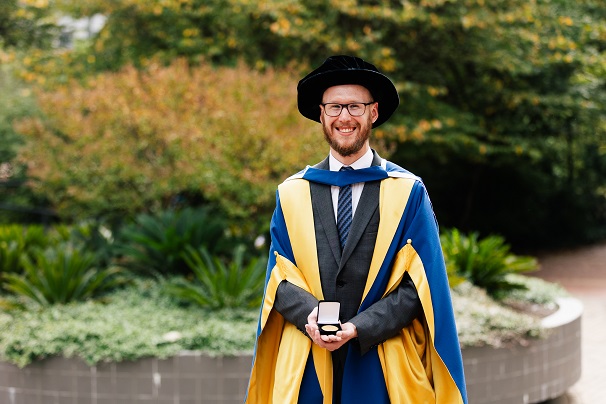
Dr Michael George Aberle received the Stephen Parker Medal, which is awarded annually to the doctoral student who has presented the most outstanding doctoral thesis for examination in the preceding calendar year. It was named in honour of Professor Stephen Parker, the University’s Vice-Chancellor between 2007 and 2016.
Dr Aberle graduated with a Doctor of Philosophy, and his thesis was titled Development and Implications of a Foundational Empirical Approach for Forensic Soil Provenancing: The Australian Capital Territory Geochemical Urban Mapping (ACTGUM) Project.
“Receiving the Stephen Parker Medal was an honour, but also unexpected – if anything, I think it’s a reflection on the overall research team and UC itself, the high quality of research that we do, and the immense support PhD candidates receive. It was an absolute privilege to work alongside my research team and supporting UC staff, who deserve more thanks than I can ever put in words,” Dr Aberle said.
“I really wanted to pursue a qualification which would help me influence the real world, and contribute to our community in Australia. For me, research in forensic science was a great fit because it combines my love of science with the ability to contribute to the investigation of serious crimes."
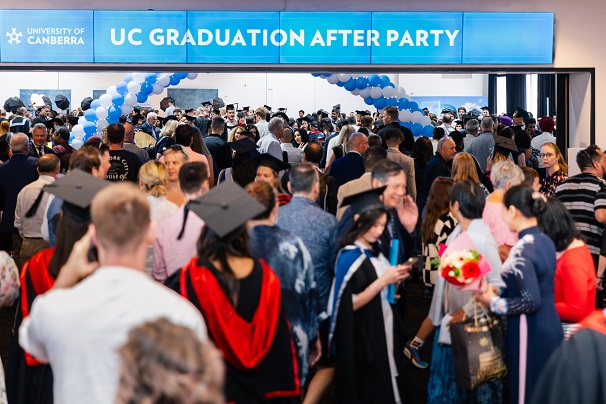
Across the ceremonies, graduating students with the highest Grade Point Average (GPA) throughout their undergraduate degrees were presented with Chancellor’s Commendations.
This year, the recipients were:
- Erin McAlister – Bachelor of Communication and Media (Marketing Communication) and Bachelor of Design (Visual Communication Design)
- Nyssa Murphy – Bachelor of Arts (Digital Media)
- John Minh Tri Vu – Bachelor of Event and Tourism Management
- Bernadette Matthew – Bachelor of Early Childhood and Primary Education
- Anastasia Ruth McGrath Stuart – Bachelor of Science in Psychology
- Jack Thomas Bell – Bachelor of Medical Science
University Medals were presented to graduating students with First Class Honoursand the highest GPA, as follows:
- Christine Marcy Miles – Bachelor of Arts and Design (Honours)
- Bhavna Varma – Bachelor of Forensic Studies and Bachelor of Laws (Honours)
- Melanie Steele-Hick – Bachelor of Science in Psychology (Honours)
- Ewen Lawler – Bachelor of Science (Honours) in Environmental Science
This year, The UC Employability and Community Award was presented for the first time, with the aim of developing students’ employability via engagement with a range of experiences and career development learning activities. It replaced the Canberra Award.
The awardees were:
- Kim Fabian Caringal – Bachelor of Software Engineering and Bachelor of Business Informatics
- Ryan Arthur James Neilsen – Bachelor of Science
- Jeffrey Newton – Master of Counselling
- Jessica Tuttle – Bachelor of the Built Environment (Architecture)


